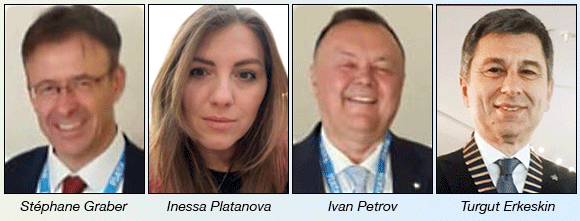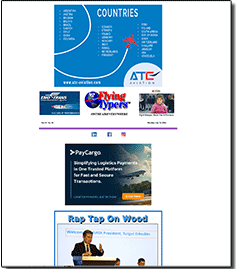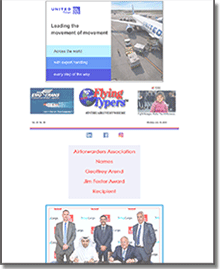LONDON CALLING
Before we get to Istanbul, let me start with an important and completely fresh piece of news, as disclosed by FIATA recently: “At its 134th session in July 2025, the IMO Council agreed to upgrade FIATA’s status from provisional to full consultative, pending final approval at the IMO Assembly in November. This distinction recognises FIATA’s sustained contribution to maritime policymaking and reinforces the influence of the freight forwarding sector in shaping international regulations. As the only representative of the freight forwarding and logistics industry at the IMO, this upgrade means that FIATA can directly shape regulations that reflect the realities of multimodal logistics and promote solutions that are workable, sustainable, and safe.”
ISTANBUL IN MY HEART
You have no idea what your international trade folder would look like tomorrow? Well, take a deep breath and try to smell the scent of cardamom that comes from the East: go to Istanbul, a city that works as treatment! Cardamom is not the only interesting spice you can find there . . .
The first time I went to Istanbul I was stuck in a big predicament: I did not know which turn my job, and consequently my life, would take: it was 1989, my 50% business partner had left the company with me singlehandedly facing all the consequences, debts and aggravation, possible default. Everything went well in the end, but the risk that things could become really tough was high. As an inspiration, or a superior commandment, I felt the urge to change my routines quite radically. Without thinking twice, I took a plane to Istanbul, it was my first time there. I wanted to see precisely the place that had connected Europe and Asia for centuries and kept the flame of Roman Empire shining for another 1000 year after the collapse of Rome.
I felt the need to reconnect with history and culture, after years spent only planning the next sales trip. That visit to Istanbul was an experience that changed my life and I shall always be grateful for the positive spin that came from it. In my view there is a special Istanbul calling and you should take note . . .
ECONOMY AND LOGISTICS IN ISTANBUL
July is the time of the events we are talking about, here or there matters not, and in July the freight forwarding and logistics industry responded enthusiastically to the powerful call coming from Istanbul, where 10th Ekonomi ve Lojistik Zirvesi (Economy and Logistics Summit) took place. That was an opportunity for FIATA to reap another recognition for its conspicuous role in the industry worldwide, whilst clearly stating a number of priorities in a period when making choices seems to become a fairly complicated affair.
 |
This is how FIATA announced the achievement to its own members: “FIATA is proud to have been recognised for its achievements in logistics as the NGO of the Year at the 10th Ekonomi ve Lojistik Zirvesi (Economy and Logistics Summit) held in Istanbul. This prestigious award, presented by the Turkish logistics community, is a testament to FIATA's growing impact and leadership in the global logistics sector. This achievement highlights the strength of FIATA’s work in recent years. FIATA expresses its gratitude to its President, Mr. Turgut Erkeskin, for his leadership, and to all Members and Partners for their continued dedication and contributions, which have made this recognition possible. FIATA was pleased to share this honour with its Immediate Past President, Mr. Ivan Petrov and Ms. Inessa Platanova, Chair of the FIATA Foundation Vocational Training (FFVT) Management Committee, who joined FIATA President, Mr. Turgut Erkeskin, and FIATA Director General, Dr. Stéphane Graber, at the event, highlighting the excellence and dynamism of the logistics sector in Türkiye and FIATA's key role in leading the industry globally.”
I do not think that the IMO exploit had already been disclosed by then, but the statement above rightfully expresses the concept that FIATA recognises the commitment of its members, who faithfully followed the flame carried by the association for nearly 100 years – celebrations for the centennial will take place in Milan in 2026 – an association that recently went through a series of significant changes, since its move to Geneva, where FIATA actually returned after several decades in Zurich.
THE VOICE OF THE PRESIDENT
FIATA’s President Turgut Erkeskin released the following statement for the Flying Typers: “Trade corridors are not just infrastructure – they are systems. And systems only function when all the actors are connected, aligned, and empowered. FIATA’s digital strategy is designed precisely to enable this connectivity and alignment across the logistics ecosystem. By building on international standards such as those developed by UN/CEFACT, FIATA ensures that freight forwarders and supply chain actors around the world can exchange trusted, structured data seamlessly and securely.”
TRADE, THE AMYGDALA AND THE CORRIDORS
Ivan Petrov, Immediate Past President of FIATA, gave a presentation at the event in Istanbul, highlighting the main point surrounding FIATA policy and the context of international trade in this period, with the pivotal FIATA multimodal concept taking front stage. The concept of multimodal corridors working as a system, as expressed by Turgut, was crystal clear also in Ivan’s words: “FIATA is looking to work with multimodal corridor management systems and welcomes creative ideas on corridor development. FIATA wished to vocalize and commit to the good functioning of corridors by working together in international collaborations and advancing best practices.”
That was the simple truth spelt out by Petrov. In light of a different trade environment, where the very concept of free trade seems to have used up its time and new agreements are struggling to find accomplishment, this systematic corridor approach may in fact provide the legal certainty and predictability that seems to have gone missing in other international negotiations – a considerable relief in the middle of the conflicting emotions of today’s trade environment. This is precisely the statement made by Ivan Petrov, who seems to anticipate a safe harbour where others can only see the staleness of uncertainty. “The stability of regional Customs should be aligned with the realities of the sector today, with seamless processes. FIATA works to facilitate this and fosters further collaboration on easing these, as FIATA experiences that the success of corridors hinges not only on physical infrastructure, but also on streamlined Customs operations at border crossings.”
TRULY MULTIMODAL
The extensive use of FIATA instruments, such as the FIATA Negotiable Multimodal Bill of Lading (FBL), the only truly multimodal negotiable transport document, now in its digital format, the eFBL, is building trust and security through digitalization, allowing freight forwarders to provide their customers with up to date negotiable trading instruments that can put them in a position to arbitrate among different markets, even when the goods are still en-route. Petrov also underlined the environmental advantages of the eFBL, calling it a “twin transition, going green and digital”.
Past President Petrov continued his speech mentioning some of the issues that are keeping FIATA’s members alert, and at times, worried: for example, “the re-positioning of transport corridors due to geopolitical challenges, with effect on the global supply chain leaving or entering a region, together with the increasing need for multimodal corridor development and regional cooperation, as we have seen recently in the Russia-Ukraine war. There is a need for advocating policies to facilitate knowledge based exchanges, expertise and best practices; the FIATA Freight Forwarding community can help overcome physical/non-physical corridor challenges and bottlenecks.”
EAST TO WEST OR WEST TO EAST WITH EASE
Such challengers highlighted the necessity to continue planning and developing new corridors, hence “FIATA encourages and promotes options in any new multimodal corridors”. For example, the Trans-Caspian International Transport Route(TITR) starts from Southeast Asia and China, runs through Kazakhstan, the Caspian Sea, Azerbaijan, Georgia and reaches the European countries. It links China and Kazakhstan by rail through Dostykor Khorgos/Altynkol, crosses Kazakhstan by rail to the port of Aktau, crosses the Caspian Sea to Baku/Alyat, and Azerbaijan and Georgia by rail to then either continue by rail to South East Europe through Turkiyeor, crossing the Black Sea. This example was surely well received by the Turkish organisers and, despite a number of difficulties that were expertly detailed by Ivan Petrov, seems to be a viable alternative in a period when alternatives may come handy.
In this light Petrov managed to play another of his aces: “Amid a regulatory shift, with different rules in trade, emissions and data privacy, FIATA is strategically placed in Geneva amongst commodity traders and shipping lines to harness and advise the freight forwarding sector on green fuel targets…” and direct it in this novel trade landscape that is yet to be explored. Much of Ivan’s concerns were focused on environmental issues, and this is surely aligned with the expected deliberations that will take place later in October in Vietnam.
Ivan remains however optimistic, as he believes that “technology is there to help and assist, removing mundane administrative tasks, optimising work processes and bookings, and why not? Using algorithms to reduce carbon emissions, facilitate route optimisation and afford efficient inventory management.” At the same time Ivan is not blindfolded by his optimism, he knows that “the increasing reliance on technology and interconnected systems in logistics makes companies more vulnerable to cyberattacks, which can disrupt operations and compromise sensitive data,” at the end of the day destroying wealth and hard earned margins instead of affording advancements. This is why FIATA, in Ivan’s words, recommends “Strong Cybersecurity Practices.”
Professor Petrov’s speech concludes on a human factor note: “The future of tomorrow is in the workforce attraction and training of today. The freight forwarding workforce is the single most important aspect of the sector’s success, because logistics is about its people!”
Impossible, at this point, to ignore the pivotal contribution that FIATA made to knowledge and learning in logistics, being “committed to providing quality, internationally recognised applied training to logistics professionals.” The FIATA Diploma in Freight Forwarding, FIATA Higher Diploma in Supply Chain Management, ICAO-FIATA Dangerous Goods by Air Training Programme (IFDG) and Young Logistics Professionals Award are just the tip of the iceberg of FIATA’s training programmes and competitions, which ran successfully for many decades.
A tribute to the country organising the event: "If geography is destiny, then logistics is Türkiye’s destiny!" clearly echoed in the hall at the end of Ivan’s presentation.
A LUCKY OCCURRENCE
 There was also a piece of news-making luck: we happened to read the following joint public statement made by the disguised group of logisticians who importantly contributed to the success of the event. “At the 10th Economy and Logistics Summit this week, we discussed global logistics trends and Turkey's place in these developments, as well as the fundamental parameters of the logistics of the future with our speakers, all representing leading global logistics institutions. We had the opportunity to share our views and thoughts on a wide range of topics, from the importance and performance of the central corridor in Turkish and global logistics to the technological applications shaping the sector; from the FIATA International Federation of Freight Forwarders Associations' multimodality and e-FBL initiatives to the global dynamics affecting global supply chains. We also owe a debt of gratitude to Mr. Cem Kacmaz for providing the opportunity to evaluate both global trends and Turkey alongside such high-level and international speakers at this most important logistics summit in Turkey.” There was also a piece of news-making luck: we happened to read the following joint public statement made by the disguised group of logisticians who importantly contributed to the success of the event. “At the 10th Economy and Logistics Summit this week, we discussed global logistics trends and Turkey's place in these developments, as well as the fundamental parameters of the logistics of the future with our speakers, all representing leading global logistics institutions. We had the opportunity to share our views and thoughts on a wide range of topics, from the importance and performance of the central corridor in Turkish and global logistics to the technological applications shaping the sector; from the FIATA International Federation of Freight Forwarders Associations' multimodality and e-FBL initiatives to the global dynamics affecting global supply chains. We also owe a debt of gratitude to Mr. Cem Kacmaz for providing the opportunity to evaluate both global trends and Turkey alongside such high-level and international speakers at this most important logistics summit in Turkey.”
This was the statement released by Ivan Petrov, Stephane Graber (FIATA’s DG) and Jeppe Vestrup Skivild, (above right) Head Of Türkiye Logistics, at DFDS)
Marco Sorgetti
|





